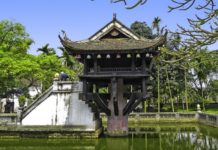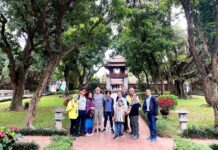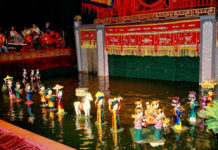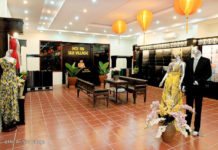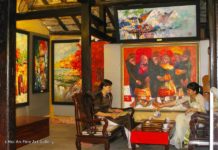Vietnam is a country rich in cultural heritage, and its wedding traditions are a testament to the deep-rooted customs and beliefs that have been passed down through generations. From the intricate pre-wedding ceremonies to the vibrant post-wedding celebrations, Vietnamese weddings are a harmonious blend of ancient rituals and modern elements. In this comprehensive blog post, we will explore the captivating world of Vietnamese wedding traditions, uncovering the history, symbolism, and evolving nature of this cherished cultural practice.
The History and Evolution of Vietnamese Wedding Traditions
Vietnamese wedding traditions have a long and fascinating history, reflecting the country’s diverse cultural influences and the resilience of its people. Over the centuries, these traditions have undergone a remarkable transformation, adapting to changing social dynamics and the introduction of new practices.
The Roots of Vietnamese Wedding Traditions
The foundation of Vietnamese wedding traditions can be traced back to the country’s ancient cultural heritage, which is heavily influenced by Confucianism, Taoism, and Buddhism. These philosophical and religious traditions have shaped the core values and beliefs that underpin the Vietnamese approach to marriage and family.
The Influence of Chinese Culture
Vietnam’s proximity to China and the historical interactions between the two countries have also played a significant role in shaping Vietnamese wedding traditions. Many of the customs and rituals observed in Vietnamese weddings bear a striking resemblance to their Chinese counterparts, showcasing the enduring impact of this cultural exchange.
The Impact of French Colonization
The French colonial era in Vietnam (1858-1954) introduced new elements to the country’s wedding traditions. During this period, some Vietnamese couples began to incorporate Western-style ceremonies and attire, blending these influences with their own cultural practices.
Adapting to Societal Changes
In the modern era, Vietnamese wedding traditions have continued to evolve, adapting to the changing social and economic landscape of the country. As Vietnam has become more integrated into the global community, some traditions have been modified to accommodate new preferences and lifestyles, while others have been preserved and celebrated as a means of maintaining cultural identity.
The Role of Family in Vietnamese Weddings
The family unit holds immense significance in Vietnamese culture, and this is reflected in the central role it plays in the wedding process. From the initial matchmaking to the post-wedding festivities, the involvement of family members is integral to the overall wedding experience.
The Importance of Family Approval
In traditional Vietnamese culture, the decision to marry is not solely an individual choice. It often involves the approval and blessings of the couple’s families, who play a crucial role in the matchmaking process and the overall planning of the wedding.
The Elders’ Involvement
The elders of the family, such as grandparents and parents, are highly respected and their guidance is sought throughout the wedding planning and execution. They are responsible for ensuring that the customs and rituals are observed correctly, as well as maintaining the family’s traditions and values.
The Extended Family Network
Vietnamese weddings are not just a celebration of the couple, but also a testament to the strength and unity of the extended family network. Relatives from both the bride’s and groom’s sides come together to support the couple, participate in the ceremonies, and strengthen the familial bonds.
The Importance of Filial Piety
Filial piety, or the respect and obedience shown by children towards their parents, is a fundamental tenet of Vietnamese culture. This concept is deeply embedded in the wedding tradition, as the couple is expected to honor their parents and seek their blessings for the union.
Pre-Wedding Ceremonies and Rituals
그만큼 Vietnamese wedding journey begins long before the actual ceremony, with a series of intricate pre-wedding rituals and ceremonies that set the stage for the grand celebration.
The Engagement Ceremony (Lễ Ăn Hỏi)
The engagement ceremony, also known as the “Lễ Ăn Hỏi,” is the first official step in the Vietnamese wedding process. During this ceremony, the groom’s family visits the bride’s family to formally ask for the bride’s hand in marriage, exchange gifts, and discuss the wedding details.
The Betrothal Ceremony (Lễ Đính Hôn)
The betrothal ceremony, or “Lễ Đính Hôn,” is the next significant step in the pre-wedding rituals. This event formalizes the engagement and solidifies the commitment between the two families. It typically involves the exchange of symbolic gifts and the signing of a marriage contract.
The Tea Ceremony (Lễ Vu Quy)
The tea ceremony, or “Lễ Vu Quy,” is a deeply meaningful pre-wedding ritual that honors the couple’s parents and elders. During this ceremony, the newlyweds-to-be serve tea to their parents and other family members, expressing their gratitude and seeking their blessings.
The Dowry Delivery (Lễ Đón Dâu)
The dowry delivery, known as the “Lễ Đón Dâu,” is a significant event in which the groom’s family presents the bride’s family with a set of gifts and valuables. This tradition symbolizes the groom’s family’s acceptance of the bride and their willingness to support the new couple.
The Bridal Procession (Rước Dâu)
The bridal procession, or “Rước Dâu,” is a vibrant and joyous ceremony where the groom and his entourage travel to the bride’s home to formally escort her to the wedding venue. This procession is often accompanied by traditional music, drums, and firecrackers, creating a festive atmosphere.
The Wedding Ceremony
The wedding ceremony itself is the culmination of the Vietnamese wedding journey, where the couple officially exchange vows and begin their journey as husband and wife.
The Traditional Attire
Vietnamese wedding attire is steeped in symbolism and tradition. The bride typically wears a áo dài, a long, form-fitting dress with a high collar, while the groom may wear a traditional Vietnamese suit or a modern tuxedo.
The Altar and Offerings
The wedding ceremony typically takes place at a traditional Vietnamese altar, which is adorned with candles, incense, and various offerings such as fruit, tea, and ceremonial items. These elements hold deep symbolic meaning and are crucial to the ceremony’s spiritual significance.
The Ancestral Worship
Honoring one’s ancestors is a fundamental aspect of Vietnamese culture, and this tradition is deeply embedded in the wedding ceremony. The couple pays respects to their ancestors, seeking their blessings and guidance for the new chapter of their lives.
The Exchange of Vows
The exchange of vows is the central moment of the Vietnamese wedding ceremony. The couple makes solemn promises to each other, often in the presence of a respected elder or a religious figure, solidifying their commitment to their marriage.
The Symbolic Rituals
Throughout the ceremony, the couple will participate in various symbolic rituals, such as the tying of the ceremonial knot, the lighting of unity candles, and the exchange of wedding rings. These rituals hold deep significance and are believed to bring good fortune and prosperity to the newlyweds.
Post-Wedding Customs and Celebrations
The celebration of a Vietnamese wedding does not end with the ceremony itself. There are a series of post-wedding customs and festivities that continue to honor the couple and strengthen the bonds between the two families.
The Wedding Feast (Đám Cưới)
The wedding feast, or “Đám Cưới,” is a lavish celebration where the newlyweds and their families, friends, and community gather to feast, toast, and enjoy traditional music and dance performances.
The Red Envelope (Lì Xì)
The giving of the red envelope, or “Lì Xì,” is a symbolic tradition where the couple’s elders and guests present the newlyweds with monetary gifts enclosed in red envelopes. This gesture is believed to bring good luck and financial prosperity to the couple.
The Newlyweds’ Duties
In the days and weeks following the wedding, the newlyweds are expected to fulfill certain duties, such as visiting the bride’s family, hosting their own wedding reception, and participating in various rituals and ceremonies.
The One-Month Celebration (Đám Hỏi)
The one-month celebration, known as the “Đám Hỏi,” is an important post-wedding event where the couple hosts a gathering to introduce the bride to the groom’s extended family and community.
The First-Year Celebrations
Throughout the first year of marriage, the couple may participate in additional celebrations and rituals, such as the first-year anniversary and the first lunar new year celebration as a married couple.
Regional Variations in Vietnamese Wedding Traditions
While there are core similarities in Vietnamese wedding traditions across the country, there are also distinct regional variations that reflect the cultural diversity of Vietnam.
Northern Vietnam Traditions
The wedding traditions in Northern Vietnam, which is heavily influenced by Chinese culture, tend to be more formal and elaborate, with a greater emphasis on ancestral worship and the role of the family elders.
Central Vietnam Traditions
The wedding traditions in Central Vietnam often incorporate more vibrant, colorful, and musical elements, drawing inspiration from the region’s rich cultural heritage and natural landscapes.
Southern Vietnam Traditions
The wedding traditions in Southern Vietnam tend to be more relaxed and informal, with a stronger focus on the celebration of the couple and the integration of modern elements.
Ethnic Minority Traditions
Vietnam is home to a diverse array of ethnic minority groups, each with their own unique wedding traditions that are deeply rooted in their respective cultural and religious practices.
Modernizing Vietnamese Wedding Traditions
As Vietnam continues to evolve and embrace global influences, the country’s wedding traditions have also undergone a process of modernization, blending the old with the new.
Incorporating Western Influences
Many Vietnamese couples are now incorporating Western-style elements into their weddings, such as the white wedding dress, the exchange of engagement rings, and the use of formal wedding venues.
Digital Transformation
The digital age has also played a role in the modernization of Vietnamese weddings, with couples using online platforms for planning, guest management, and even live-streaming their ceremonies.
Sustainability and Eco-Friendly Practices
Increasingly, Vietnamese couples are also embracing sustainable and eco-friendly practices in their weddings, such as using locally sourced and organic materials, and minimizing waste.
Personalization and Creativity
As Vietnamese wedding traditions evolve, couples are also finding ways to personalize their ceremonies, infusing their own unique styles and creative touches while still honoring the cultural heritage.
Cultural Influences on Vietnamese Wedding Traditions
The rich tapestry of Vietnamese wedding traditions is woven with the influence of various cultural and religious traditions, each adding its own unique thread to the overall design.
Confucianism and the Emphasis on Filial Piety
Confucianism, with its emphasis on filial piety and the importance of family, has had a profound impact on Vietnamese wedding traditions, particularly in the role of the elders and the emphasis on ancestral worship.
Buddhism and the Concept of Spiritual Harmony
The Buddhist principles of spiritual harmony and the interconnectedness of all things are reflected in Vietnamese wedding customs, such as the use of symbolic offerings and the reverence for ancestral spirits.
Taoism and the Pursuit of Balance
Taoist beliefs, with their focus on the balance of yin and yang, have influenced various aspects of Vietnamese wedding traditions, including the choice of auspicious dates and the use of specific colors and symbols.
Folk Beliefs and Superstitions
Vietnamese wedding traditions also incorporate a rich tapestry of folk beliefs and superstitions, passed down through generations and deeply ingrained in the cultural psyche of the Vietnamese people.
The Symbolism of Vietnamese Wedding Customs
At the heart of Vietnamese wedding traditions lies a intricate system of symbolism, with each ritual and custom imbued with deep meaning and significance.
The Significance of Colors
The colors used in Vietnamese weddings, such as red, gold, and white, hold powerful symbolic meanings, representing elements like prosperity, happiness, and purity.
The Importance of Numbers
Numerology plays a crucial role in Vietnamese wedding traditions, with certain numbers, such as 8 and 9, being considered auspicious and bringing good fortune.
The Symbolism of Flowers and Fruits
The use of specific flowers and fruits in Vietnamese weddings is not merely decorative; each item holds symbolic meaning, representing qualities like fertility, longevity, and prosperity.
The Role of Ancestral Spirits
The reverence for ancestral spirits is a fundamental aspect of Vietnamese culture, and this belief is deeply embedded in the wedding traditions, with the couple seeking the blessings and guidance of their ancestors.
Preserving and Promoting Vietnamese Wedding Culture
As the world becomes increasingly interconnected, there is a growing effort to preserve and promote the rich heritage of Vietnamese wedding traditions, ensuring that this cultural legacy is passed down to future generations.
Education and Awareness Campaigns
Initiatives by the government, cultural organizations, and educational institutions aim to educate the public, both within Vietnam and globally, about the significance and beauty of Vietnamese wedding traditions.
Incorporating Traditions into Modern Weddings
Many couples, both in Vietnam and in the Vietnamese diaspora, are actively incorporating traditional elements into their modern wedding celebrations, ensuring that these customs remain relevant and vibrant.
Promoting Vietnamese Artisanal Crafts
The handcrafted traditions that are integral to Vietnamese weddings, such as the creation of áo dài, ceremonial altars, and traditional decorations, are being actively promoted and celebrated, supporting local artisans and preserving these specialized skills.
Fostering Cultural Exchange
Vietnam’s wedding traditions are increasingly being shared with the international community through cultural exchange programs, allowing for a deeper understanding and appreciation of this rich heritage.
결론
그만큼 wedding traditions of Vietnam are a captivating tapestry of history, symbolism, and cultural diversity. From the intricate pre-wedding ceremonies to the vibrant post-wedding celebrations, these customs reflect the deep-rooted values and beliefs that have been passed down through generations. As Vietnam continues to evolve and embrace global influences, its wedding traditions are also undergoing a process of modernization, blending the old with the new while preserving the essence of this cherished cultural heritage.
Through the preservation and promotion of these traditions, the Vietnamese people ensure that their rich wedding culture remains a vibrant and integral part of their identity, both within the country and in the global community. By sharing their wedding traditions with the world, Vietnam invites us to step into the enchanting world of its cultural heritage, where the past and the present seamlessly intertwine, creating a truly remarkable and unforgettable experience.The wedding traditions of Vietnam are a captivating tapestry of history, symbolism, and cultural diversity. From the intricate pre-wedding ceremonies to the vibrant post-wedding celebrations, these customs reflect the deep-rooted values and beliefs that have been passed down through generations. As Vietnam continues to evolve and embrace global influences, its wedding traditions are also undergoing a process of modernization, blending the old with the new while preserving the essence of this cherished cultural heritage.
Through the preservation and promotion of these traditions, the Vietnamese people ensure that their rich wedding culture remains a vibrant and integral part of their identity, both within the country and in the global community. By sharing their wedding traditions with the world, Vietnam invites us to step into the enchanting world of its cultural heritage, where the past and the present seamlessly intertwine, creating a truly remarkable and unforgettable experience.


